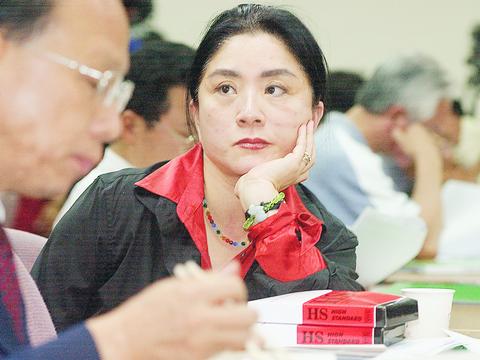With 51 votes for and 14 against, the DPP legislative caucus passed a resolution yesterday saying that DPP Legislator-at-large Chiu Chang (
The passing of the resolution means that Chiu's case will be passed on to the party's Central Review Committee (CRC,
The party alleges that in refusing to show her ballot, Chiu ignored a party resolution requiring members to show how they voted. Chiu's refusal, the resolution said, cast doubt on whether she had voted for the DPP candidate.

PHOTO: LIAO RAY-SHANG, TAIPEI TIMES
On April 1, the party's CRC voted 8 to 2 to strip Chiu of her membership. That ruling, however, was overturned by the DPP Arbitration Committee on April 3, because of procedural flaws.
Yesterday's meeting started with a videotape of the incident, after which Chiu spoke in her defense. Following Chiu, reports were presented by Tsai Huang-liang (
Even though the meeting was help in a spirit of openness, there are reports that the party's Justice Alliance (
If the CRC decides to expel Chiu, she will become the third DPP legislator to be expelled from the party in its history, following Hou Hai-hsiung (侯海熊) and Chang Chin-cheng (張晉城). She would also lose her post as a legislator-at-large and become one the legislature's shortest-serving members ever.
In reaction to the landslide decision in favor of passing her case on to the CRC, Chiu said, "It's OK, I'll continue fighting," adding that she had submitted a request for a constitutional interpretation last week.

Taiwan is stepping up plans to create self-sufficient supply chains for combat drones and increase foreign orders from the US to counter China’s numerical superiority, a defense official said on Saturday. Commenting on condition of anonymity, the official said the nation’s armed forces are in agreement with US Admiral Samuel Paparo’s assessment that Taiwan’s military must be prepared to turn the nation’s waters into a “hellscape” for the Chinese People’s Liberation Army (PLA). Paparo, the commander of the US Indo-Pacific Command, reiterated the concept during a Congressional hearing in Washington on Wednesday. He first coined the term in a security conference last

Prosecutors today declined to say who was questioned regarding alleged forgery on petitions to recall Democratic Progressive Party (DPP) legislators, after Chinese-language media earlier reported that members of the Chinese Nationalist Party (KMT) Youth League were brought in for questioning. The Ministry of Justice Investigation Bureau confirmed that two people had been questioned, but did not disclose any further information about the ongoing investigation. KMT Youth League members Lee Hsiao-liang (李孝亮) and Liu Szu-yin (劉思吟) — who are leading the effort to recall DPP caucus chief executive Rosalia Wu (吳思瑤) and Legislator Wu Pei-yi (吳沛憶) — both posted on Facebook saying: “I

The Ministry of Economic Affairs has fined Taobao NT$1.2 million (US$36,912) for advertisements that exceed its approved business scope, requiring the Chinese e-commerce platform to make corrections in the first half of this year or its license may be revoked. Lawmakers have called for stricter enforcement of Chinese e-commerce platforms and measures to prevent China from laundering its goods through Taiwan in response to US President Donald Trump’s heavy tariffs on China. The Legislative Yuan’s Finance Committee met today to discuss policies to prevent China from dumping goods in Taiwan, inviting government agencies to report. Democratic Progressive Party Legislator Kuo Kuo-wen (郭國文) said

Sung Chien-liang (宋建樑), who led efforts to recall Democratic Progressive Party (DPP) Legislator Lee Kun-cheng (李坤城), was released on bail of NT$80,000 today amid outcry over his decision to wear a Nazi armband to questioning the night before. Sung arrived at the New Taipei District Prosecutors’ Office for questioning in a recall petition forgery case last night wearing a red armband bearing a swastika, carrying a copy of Adolf Hitler’s Mein Kampf and giving a Nazi salute. Sung left the building at 1:15am without the armband and covering the book with his coat. Lee said today that this is a serious